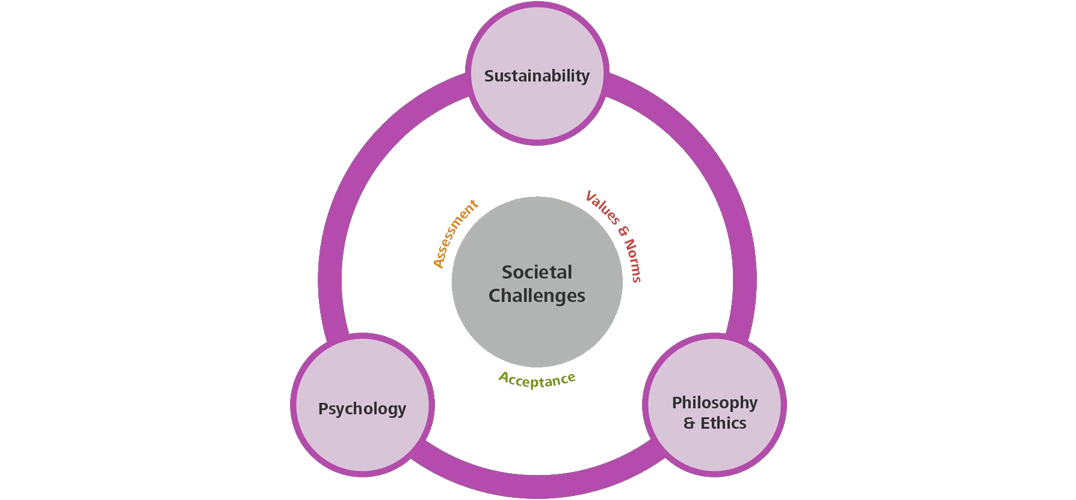Research Area D

Societal challenges and Sustainability
Aspects of sustainability, psychological acceptance and ethical approval will be an important driver of the work done in livMatS. Research and development are carried out in constant, concurrent reflection of the sustainability of the applied approaches. At the same time, questions of societal acceptance and the philosophical clarification of traditional notions of what is considered “natural”, “artificial”, “living” or “inanimate” have an important impact on an appropriate public perception. This is because living materials systems are linked to certain attitudes and preconceptions in both, science and society.
The development of living materials systems will be part of a responsible scientific and technical progress in the Anthropocene, the current era in the history of the Earth dominated by human impact on life and inanimate nature. Instead of first completing the technological development and then analyzing the implications for society, livMatS will closely interweave technology development with sustainability assessments, behavioral analyses regarding acceptance, and the philosophical-ethical discourse on the interplay between human control and autonomy of systems. For this purpose, livMatS connects experts from the natural and engineering sciences with those from sustainability research, psychology, philosophy, and ethics. The aim is to meet people's demands for future-oriented environmental and energy technologies.
Coordinator Research Area D
Prof. Dr. Andrea Kiesel
Projects within Research Area D
Longterm Projects 2022 and 2023
- Sustainability Systems Assessment of the livMatS materials systems for enabling sustainability transitions towards a resource-efficient and resilient infrastructure
- Trust in bioinspired technologies in light of the ‘normativity of nature’
- "System" as an interdisciplinary concept and the research on living materials systems
- Predicting attitudes and behavior concerning living materials: Assessing the reliability of the CAM method as a measurement tool
- Analyzing the core concept of sustainability: An interdisciplinary approach combining cognitive affective mapping and philosophical reflection
This project is carried out within the Cluster’s Hermann Staudinger Doctoral Fellowship Program.
Longterm Projects 2019 and 2020
- livMatS as part of and reaction to the Anthropocene: Ethical and philosophical implications of living materials systems
- Collection and evaluation of basal attributes of living materials systems
- Predicting attitudes and behavior concerning living materials: Development of software and analysis methods to apply cognitive affective maps
- Development of a TAPAS (Tiered Approach for Prospective Assessment of Benefits and Challenges) and first applications
- Demonstrator for soft autonomous machines – soft robotic low energy gripper systems with sensing capabilities based on livMatS Materials
This project is a collaboration between research areas B, D and Demonstrators.
Booster Projects 2023 - finished
- Identification of ethical issues and the influence of multiple core constructs on the acceptability of emerging technologies – a large-scale online survey
Principal Investigator: Prof. Dr. Andrea Kiesel - Intra- and extracellular self-assembly of filamentous protein polymers
This project is a collaboration between research areas B, C and D.
Principal Investigator: Prof. Dr. Ralf Reski - Modelling Abscission of Plant Organs as Inspiration for the Separation of Artificial Materials Systems
This project is a collaboration between research areas C and D.
Principal investigator: Dr. Olga Speck
Responsible Investigator: Prof. Dr. Patrick Dondl - A sustainable approach towards peptide synthesis in water
This project is a collaboration between research areas A, B, D and Demonstrators.
Junior Research Group leader: Dr. Charalampos Pappas
Principal Investigator: Prof. Dr. Jürgen Rühe - Carbohydrates as predetermined enzymatic breaking points in surface-bound cross-linked polymers
This project is a collaboration between research areas B and D.
Principal Investigator: Prof. Dr. Jürgen Rühe
Responsible Investigator: Prof. Dr. Daniel B. Werz - Zinc(Photo)Batt
This project is a collaboration between research areas A and D.
Principal Investigator: Prof. Dr. Anna Fischer
Responsible Investigator: Dr. Daniel Biro
Booster Projects 2021 - finished
- What Drives Ethical Decisions? Ethical Evaluation of Bioinspired Technologies in real time
Principal Investigator: Prof. Dr. Lore Hühn
Responsible Investigator: Prof. Dr. Oliver Müller
Compact Projects 2021 - finished
- The autonomy of nature. Rethinking the status of nature in livMats and the Anthropocene
Principal Investigator: Prof. Dr. Lore Hühn
Compact Projects 2020 - finished
- The concept of life in livMatS and the Anthropocene
Principal Investigator: Prof. Dr. Lore Hühn